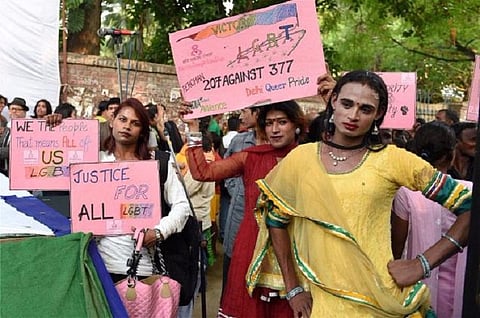

The Rights of Transgender Persons Bill was passed in the Rajya Sabha last year amidst much cheer about progress and inclusivity. Historic in deed and nature, it was moved by DMK MP Tiruchi Siva in April 2015, making it the first ever private member’s bill to be approved by the Upper House after 45 years. However, disappointed activists and members of the community say now that the updated cabinet approved bill is a watered-down version of the original one.
Activists say that The Transgender Persons (Protection Of Rights) Bill 2016 clubs various gender and sexual identities under one umbrella term, fails to provide protection and deals with the transgender community’s inclusion in a half-baked manner.
“They want to give rights to transgender persons without being clear about who they are,” argues Gopi Shankar, an intersex person and activist. Ze is referring to the haphazard way the bill defines a “transgender person” –
(A) neither wholly female nor wholly male; or
(B) a combination of female or male; or
(C) neither female nor male; and
whose sense of gender does not match with the gender assigned to that person at the time of birth, and includes trans-men and trans-women, persons with intersex variations and gender-queers.
Gopi points out this definition fails to demarcate between gender and sexual identities and adds that they wanted a separate charter for intersex persons, which ze explains, is medically a biological condition. ‘Transgender’, by contrast, is a gender identity. Ze says that while Trichy Siva agreed last year and did not include ‘intersex’ persons in the same bill, something obviously went wrong. In a recent interview to Indian Express, Siva said that the government had not consulted him for the updated draft and it was a “diluted” one.
“Now they have used one umbrella ‘transgender’ term to define everything. They haven’t even taken into account the different cultural identities that exist within the transgender community,” ze says.
One of the cultural identities Gopi is referring to is the hijra community. However, ze cautions that not every transgender person is a hijra – an assumption that ze believes the bill makes.
The new draft bill also aims to protect the “traditional” and “recreational” practices of the transgender community. Neysara Rai, a transwoman and activist, argues how this could perpetuate the already rampant trafficking, begging and forced prostitution among transgender persons.
Gopi explains here what is called the ‘jamaat’ system, where individuals, upon realizing their transgender identities, may escape their unsupportive families and be taken under the wing of a transgender or hijra ‘guru’. Here, they are often compelled into beggary and sex work. And if the guru approves their sex reassignment surgery, the individual must do the guru’s bidding (beggary, mujra, sex work) until he/she repays the debt.
Neysara says that these practices, including begging at weddings and functions, can be interpreted as “cultural” and “recreational” and children especially are most vulnerable to be trapped in this cycle.
In other aspects also, the bill fails to protect transgender children. “If a child does not find support at home, then it should be made the school’s responsibility to provide free education or free accommodation in a hostel. Saying that there should be no discrimination in employment and education on the basis of being a transgender person is not enough,” Neysara opines.
The bill also provides for a certificate of identity as a transgender person. Neysara says that mandating one identity because you don’t fit into the binary is problematic. Conversely, for someone who has gone through a sex reassignment surgery, it is unfair for them to be limited to a ‘transgender’ identity if they do not wish to be.
Neysara underwent sex reassignment surgery in 2006 and says that she is “a woman, a wife and a mother”. “I don’t want the government telling me I am a transgender person. Even my marriage will become invalid,” she says.
She insists that the Indian government should see self-recognition as an individual right. “By mandating us to be transgender persons forever, they are stigmatizing us more,” she says.
“We don’t want reservation. You think if they make reservations for us in the Parliament, we could just walk in and be taken seriously?” questions Neysara. “We want protection, not reservation,” she says.